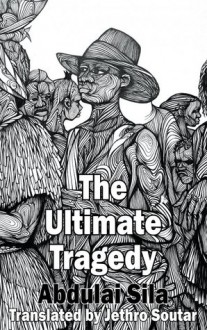
In 2017, this book apparently became the first novel (though more of a novella really, clocking in around 180 pages) from Guinea-Bissau to be translated into English. It doesn’t do too well in the storytelling department, and despite being first published in 1995 it is a simplistic criticism of Portuguese colonialism (Guinea-Bissau became independent in 1973-1974), so I can see why there wasn’t a rush to translate. But of course there’s something to be said for reading voices from a particular place even if their literary merits are weak.
There will be SPOILERS below, though no more than are found in the book description (which gives away most of the story).
The book begins with a teenage girl, Ndani, traveling from her village to the capital city, Bissau, with hopes of becoming a domestic servant in a Portuguese home. After a few chapters, it skips abruptly to a village chief, smarting over an insult from a colonial official and thinking at great, repetitive length about the paramount importance of thinking. The stories come together when the chief marries Ndani (who has somehow learned to be a great lady by being a housegirl, yet is somehow the only such woman available even though the earlier chapters show that there are plenty of housegirls, and Ndani is not the brightest bulb on the tree). Then she falls in love with a local teacher, a young man trained by priests but questioning the righteousness of colonial rule. Tragedy, naturally, ensues.
The story is kind of a mess, unfortunately. It skips long periods of time without giving any sense of what Ndani’s life was like in the interim, leaving unanswered questions in its wake. Ndani’s abrupt shift from housegirl to fancy lady is not particularly convincing, nor did I find her cheerful willingness to jump right into sex believable from a woman whose only sexual experiences were rape. There’s a prophecy about Ndani that causes people to shun her, until they don’t, with no reason I could see for the change of heart other than that this plot device was no longer needed. Being in the chief’s head is tedious due to the long-winded repetition, and the teacher’s realization that the reality of colonial rule is inconsistent with Christian principles is painfully obvious; decades after colonial rule ended, I doubt this was a new idea to the book’s readers.
The translation is fairly smooth, but a number of words and concepts are left untranslated, and these are not always immediately obvious from context; most of these words appear to be from a local African language and were probably untranslated in the Portuguese original too, but a glossary would help foreign readers understand the references to local culture better.
Ultimately, this is a fairly quick and easy read, but the simplistic political commentary dominates over the story; I missed more of Ndani’s life than I saw, never got to know who she was as a person, and had no particular reason to care about her or anyone else in the story (her mistress was perhaps the most interesting character to me - a Portuguese woman who, after a near-death experience, devotes herself to "improving the natives" - but this character doesn't have the space to fully develop). I wouldn’t recommend this one unless you are specifically looking to read a book from Guinea-Bissau. If you are, this is a readable option.

 Log in with Facebook
Log in with Facebook 





